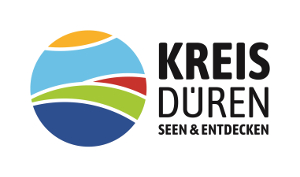Tour of Düren’s Lakes
Düren
Follow the course of the River Rur and stop off at the bathing lakes in Düren. This 19.4-kilometre loop starts in the town centre and has been assigned a difficulty level of easy.
Route terrain: Tarmac and fine gravel alongside the River Rur.
Exactly two kilometres away from the train station, at the end of Tivolistraße (Junction 9), you will come across the Rur Bank Cycle Route. The River Rur will be on your left and you will see a never-ending sea of green on your right. The route will take you past the beautiful Merkener Busch conservation area. The wooded area provides a habitat for many wild animals. You may even be lucky enough to spot one of the beavers that have been reintroduced to the area. After 6.5 kilometres, you will reach Merken Bridge, which you will use to cross the River Rur. At this point, you will go past Merken, which, as the northernmost district of Düren, isn’t far from the Inden Open Pit Mine. If you look to the right, you will see the Indemann observation tower and the mine is just a few hundred metres away. Looking straight ahead, you’ll be able to see the Eifel region and the radio tower in the Hürtgenwald district. At this point, it will become clear just how diverse the countryside in Düren and the surrounding area is.* Once you reach Echtz, you will pass the campsite on the left and then come to the entrance to the lake. You will need to pay a small fee to enter, but the terrace bar is a great place to stop for a well-earned rest. This lake is what is left of a brown coal open pit mine. The next destination on the tour is Gürzenich. The paper mill road sign points in the direction of what is arguably Düren’s most important line of industry. After all, paper production in the area dates back to the start of the 18th century. One reason that paper mills were set up here was the soft water from the River Rur that has its source in the High Fens. In the wake of an eventful past, there are still almost 30 companies producing or processing paper in Düren, Jülich and the surrounding area. Together they represent a line of industry that has a long tradition in the Düren region and has seen a great deal of success along the way. The area we now call Gürzenich Bathing Lake used to be known as Düren Open Pit Mine, as the lake is what is left of a brown coal open pit mine filled with gravel. Brown coal was mined here between 1941 and 1956 (with mining interrupted by the Second World War during this time). These days, you can pay a reasonable entry fee for access to a sandy beach spanning 600 metres and Strandwerk, a lakeside restaurant with a stunning view. All you sporty types will be in your element here, as you can take your pick from the water skiing facilities (www.wasserski-dueren.de), volleyball and basketball courts and swimming islands complete with diving boards. You can even hire pedaloes here.
Once you’re back on the Rur Bank Cycle Route and then Tivolistraße, you can make your way back into Düren town centre. We highly recommend that you explore the area around the marketplace, the Town Hall and St. Anne’s Church. You’ll find plenty of family-friendly places to stop for refreshments in this part of town.
Highlights:
· Düren-Gürzenich Bathing Lake + “Strandwerk Düren” restaurant, Am Badesee, 52349 Düren-Gürzenich
· Düren-Echtz Bathing Lake + restaurant, Campingstraße 50, 52353 Düren
· Indemann observation tower + restaurant, Zum Indemann 1, 52459 Inden
· Leopold Hoesch Museum, Hoeschplatz 1, 52349 Düren
· Paper Museum (reopened in 2018)
· St. Anne’s Church, Ahrweilerplatz 11, 52349 Düren






















![Ruraue [27] Viewpoint, © Rureifel-Tourismus e.V. - Dennis Winands Ruraue [27] Viewpoint, © Rureifel-Tourismus e.V. - Dennis Winands](http://www.tourismus.kreis-dueren.de/images/trux4_twic0-/ruraue-27-gezichtspunt.jpg)
